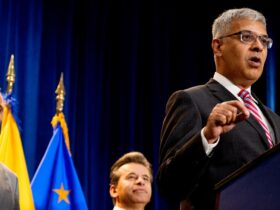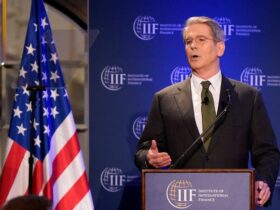As a Harvard Kennedy School graduate and current research fellow, I’ve watched with growing unease as my university squares off against the Trump administration. What began as demands to address antisemitism has escalated into a high-stakes battle where Jewish interests risk becoming collateral damage.
I feel torn, caught between two truths and two failures.
The Trump administration’s letter to Harvard included demands which, on their face, were reasonable: combat antisemitism, eliminate discrimination, ensure that students and faculty are chosen based on merit, reform curricula with histories of anti-Jewish and anti-Israel bias and take a hard line on support for terrorism. As an Israeli-American Jew within the Harvard community, I recognize these as valid issues requiring attention.
Yet the manner of intervention — threatening Harvard’s tax-exempt status and demanding sweeping control over university operations — constitutes government overreach that should alarm anyone committed to academic freedom and civil independence. If Trump’s threat were to materialize, it would have deeply damaging consequences.
By that logic, churches and Jewish organizations such as the Reform movement’s Religious Action Center wouldn’t have had leading roles in the civil rights movement. Such interference would lead to widespread self-censorship across civil society.
We’re already seeing this unfold: international students report silencing themselves out of fear that speaking up could jeopardize their visas. Even several of my Israeli colleagues, who might be expected to feel emboldened by Trump’s actions, have admitted to abandoning plans to publicly criticize the administration, worried it could affect their immigration status.
What’s equally troubling is watching Harvard’s newfound institutional courage being celebrated across campus. The administration’s principled stand against government intrusion certainly deserves respect.
But where was this moral leadership after Oct. 7, when Jewish students faced intimidation and isolation? Why did it take an existential threat to the university’s finances and autonomy to discover the backbone that was nowhere to be found when Jewish students needed protection?
And throughout it all, antisemitism — real, rising and raw — has been sidelined.
Earlier this month, Pennsylvania Gov. Josh Shapiro (D) narrowly survived a terrorist arson attack at the governor’s residence. The attacker explicitly cited that he was sending a message to Shapiro that he would not “take part in his plans for what he wants to do to the Palestinian people.”
For 18 months, I have heard reassurances that anti-Israel protesters harbor no violent intentions despite their inflammatory language. But as someone who grew up in Israel during Rabin’s assassination, it taught me a painful lesson: Mass movements and unchecked incitement inevitably inspire extremists to “take matters into their own hands.”
We were lucky this time. But what if Shapiro had been killed? Would we still call concerns about antisemitism “overblown”?
Neither the administration nor the university truly centers Jewish security in this conflict. Trump officials appear primarily interested in humiliating elite institutions to satisfy their base, while Harvard seems primarily concerned with preserving institutional autonomy. For 18 months, Jewish concerns about campus climate fell on deaf ears, until Harvard’s endowment was threatened.
History offers a sobering lesson: When powerful institutions clash, Jews often pay the price regardless of which side prevails. Yes, antisemitism is real. But so is the danger of a government that decides what can be taught, who can be admitted, and what can be said. Both dangers are historic red flags for Jews.
The path forward requires rejecting this false binary. We cannot afford to align ourselves with either side in this conflict. Our responsibility is not to join ideological camps but to hold both accountable.
The historical experiences that have shaped the American Jewish community make it an imperative interest that America remain democratic and pluralistic, with stable civil institutions capable of defending themselves and protecting their minorities.
Jewish communities should not be forced to pick between political extremes. Instead, they should demand that universities address antisemitism seriously, without inviting government overreach that threatens academic freedom. Our safety lies in stable, pluralistic institutions, not political score-settling.
There is truth in what Trump demands and truth in what Harvard defends. But if neither side is willing to acknowledge the other’s truth, it will be Jews, yet again, who will be left to bear the cost.
Barak Sella is the Middle East Initiative Fellow at the Harvard Kennedy School of Government.
















Leave a Reply